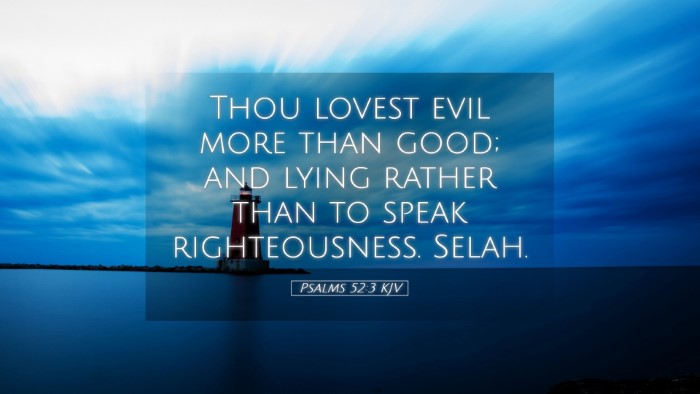Commentary on Psalms 52:3
"Thou lovest evil more than good; and lying rather than to speak righteousness." - Psalms 52:3
Context and Overview
The context of Psalm 52 is instrumental in understanding this profound declaration regarding the wickedness of man. This psalm, attributed to David, is framed within the narrative of Doeg the Edomite, who betrayed Priests at Nob and reported David's whereabouts to King Saul. This betrayal sets the stage for David's fierce condemnation of wickedness.
Analysis of "Thou lovest evil more than good"
Matthew Henry's Commentary: Henry emphasizes that this phrase illustrates a profound love for wickedness, suggesting that the speaker observes a deliberate choice of evil over righteousness. The moral depravity is depicted as a conscious preference, illustrating the heart's condition of one who loves evil.
Albert Barnes' Notes: Barnes expands on this notion by explaining that such a person has a systematic inclination towards wrongdoing. He discusses the implications of choosing evil as a marker of one's character and the futility of pretending to love good while committing acts of malice.
Adam Clarke's Commentary: Clarke mentions that loving evil indicates a deep-seated rebellion against God's standards. He argues that this love for evil manifests in one's actions, serving as evidence of an unregenerate heart.
Analysis of "and lying rather than to speak righteousness"
Matthew Henry: Here, Henry notes that the explicit choice of falsehood over truth exemplifies a moral failing. Lies are often favored by those who look to serve their own interests, highlighting a corrupt nature that prioritizes deception.
Albert Barnes: Barnes points out that lying often accompanies wickedness, as it is a tool used by the unjust to manipulate reality and mislead others. He emphasizes the seriousness of lying as not merely a social fault but a deep spiritual crisis that stands in stark opposition to God’s truth.
Adam Clarke: Clarke points out that to speak righteousness is to align oneself with God's character. Thus, the act of lying depicts a rejection of the truth and a disconnect from divine principles.
Theological Implications
The implications of this verse extend beyond mere observation; it serves as a moral indictment against those who choose to align themselves with evil. The conscious choice of sin reveals the inner disposition of the heart which, in a biblical understanding, is often referred to as the 'wicked heart'.
- Revelation of Character: This verse encourages introspection regarding one’s own character and decisions. It challenges individuals to recognize the weight of their choices.
- Judgment of God: It underscores the belief in ultimate divine judgment, as the Lord evaluates the hearts of men (1 Samuel 16:7).
- Moral Consequences: It sheds light on the consequences of embracing a lie as part of one's identity, leading to spiritual decay and separation from the truth of God.
Application for Pastors and Theologians
For pastors and theologians, this psalm serves as a compelling reminder of the ongoing struggle between good and evil within the human heart. It invites Christian leaders to:
- Preach against Evil: Address the reality of loving evil and the grave implications it has for individuals and communities.
- Emphasize Truth: Assert the necessity of speaking and living by the truth as a reflection of God’s character.
- Encourage Accountability: Foster environments where congregants are encouraged to examine their choices in light of Scripture and to pursue righteousness.
Conclusion
Psalms 52:3 stands as a stark proclamation against the love of evil and the preference for lies over truth. Drawing from the insights of Matthew Henry, Albert Barnes, and Adam Clarke, this commentary highlights the deep moral and theological implications of the verse. It challenges readers to reflect deeply on their hearts, prompting a return to righteousness and truth in an age that often celebrates wickedness.


